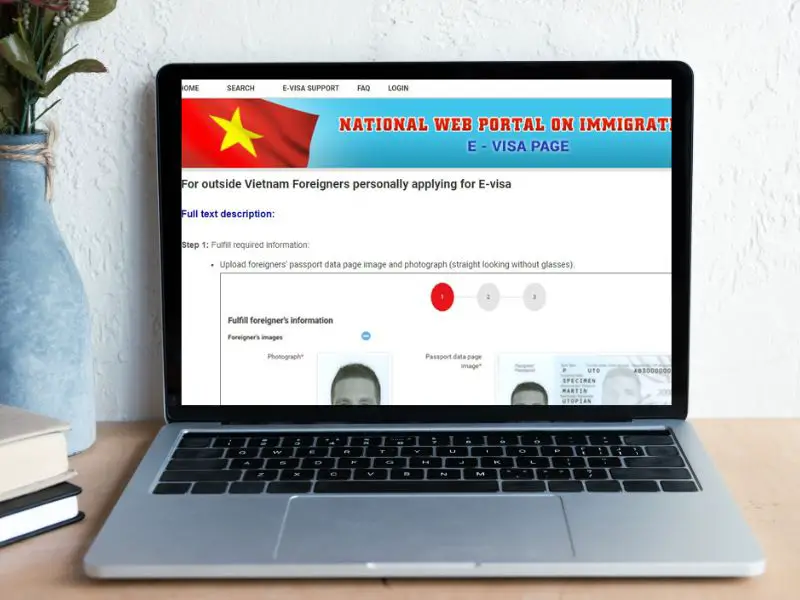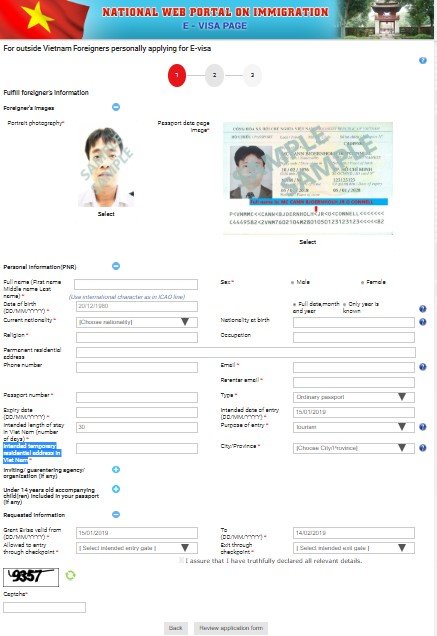Planning a trip to Vietnam can be an exciting adventure, but understanding the visa requirements can feel like navigating a maze. With different options available and varying requirements for citizens of different countries, it can be overwhelming to figure out the best way to obtain a visa for your trip. This guide aims to simplify the process by providing tailored information for citizens of specific countries. From applying for an e-visa to understanding the special considerations for business travelers, this article will cover everything you need to know about vietnam visa requirements.
Table of Contents
Applying for a Vietnam E-Visa: A Step-by-Step Guide
For many nationalities, applying for a Vietnam e-visa is the most convenient option. This online process eliminates the need for a visa on arrival or an embassy visit. Here’s a step-by-step guide:
- Visit the official Vietnam e-visa website: https://evisa.xuatnhapcanh.gov.vn/trang-chu-ttdt
- Select your nationality and travel dates: This determines your eligibility and visa fee.
- Fill out the online application form: Provide accurate information, including your passport details, travel plans, and accommodation details.
- Upload a passport photo and supporting documents: Follow the website’s guidelines for acceptable formats.
- Pay the visa fee: Secure payment options like credit cards are available.
- Receive your e-visa by email: Download and print the visa for presentation at immigration upon arrival.

Special Considerations for Business Travelers: Vietnam Visa Options
Business travelers may need different visa types depending on the duration and purpose of their visit. The two main options for business visas in Vietnam are the e-visa and the visa on arrival.
E-Visa for Vietnam
The e-visa is a popular choice for business travelers as it allows for a stay of up to 30 days and can be obtained entirely online. However, it is important to note that the e-visa is only valid for certain purposes, such as attending meetings, conferences, or conducting business activities. It cannot be used for employment or long-term stays.
To apply for an e-visa, follow the steps outlined above in the “Applying for a Vietnam E-Visa” section. When filling out the application form, make sure to select the appropriate purpose of your visit as “Business/Investment.”
Visa on Arrival for Vietnam
The visa on arrival is another option for business travelers, but it requires some additional steps. First, you will need to obtain a visa approval letter from a travel agency or company in Vietnam. This letter will then be used to obtain a visa stamp upon arrival at one of Vietnam’s international airports.
It is important to note that the visa on arrival is only available for citizens of certain countries. Additionally, it may not be suitable for those with tight schedules as it involves waiting in line at the airport to obtain the visa stamp. It is recommended to use this option only if the e-visa is not available for your nationality.
Visa Requirements for Citizens of Specific Countries: Tailored Information
As mentioned earlier, the visa requirements for Vietnam vary depending on your nationality. Here is a breakdown of the different options available for citizens of specific countries:
Vietnam Visa for US Citizens
US citizens have three options for obtaining a visa for Vietnam: e-visa, visa on arrival, or embassy visa. The e-visa and visa on arrival options are the most convenient, while the embassy visa requires an in-person visit to the nearest Vietnamese embassy or consulate.
Vietnam Visa for UK Citizens
UK citizens also have the same three options as US citizens. However, it is important to note that the e-visa is only available for UK citizens who hold a British Citizen passport. Those with a British Overseas Territories Citizen, British Overseas Citizen, or British National (Overseas) passport are not eligible for the e-visa and will need to apply for an embassy visa.
Vietnam Visa for Australian Citizens
Australian citizens can also choose between the e-visa, visa on arrival, or embassy visa options. However, it is important to note that the e-visa is only available for those holding an Australian passport with at least six months’ validity remaining.
Vietnam Visa for Canadian Citizens
Canadian citizens have the same three options as US and UK citizens. However, it is important to note that the e-visa is only available for those holding a Canadian passport with at least six months’ validity remaining.
Vietnam Visa for Indian Citizens
Indian citizens can obtain a visa for Vietnam through the e-visa or embassy visa options. The visa on arrival option is not available for Indian citizens. It is important to note that the e-visa is only available for Indian citizens who hold an Indian passport with at least six months’ validity remaining.
Vietnam Visa for Chinese Citizens
Chinese citizens can obtain a visa for Vietnam through the e-visa or embassy visa options. The visa on arrival option is not available for Chinese citizens. It is important to note that the e-visa is only available for Chinese citizens who hold a Chinese passport with at least six months’ validity remaining.

Visa on Arrival: A Convenient Option for Some Travelers
The visa on arrival option is available for citizens of certain countries who are arriving in Vietnam by air. This includes those who are not eligible for the e-visa and those who require a longer stay than what the e-visa allows. Here’s how to obtain a visa on arrival:
- Obtain a visa approval letter from a travel agency or company in Vietnam.
- Upon arrival at one of Vietnam’s international airports, present the visa approval letter and pay the visa stamping fee.
- Receive your visa stamp and enter Vietnam.
It is important to note that the visa on arrival option is only available for those arriving by air. If you are entering Vietnam by land or sea, you will need to obtain a visa through the e-visa or embassy visa options.
Extending Your Visa in Vietnam: Understanding the Process
If you wish to extend your stay in Vietnam beyond the validity of your visa, you can apply for a visa extension. Here’s what you need to know about the process:
- The maximum extension period for a tourist visa is 30 days.
- The maximum extension period for a business visa is three months.
- You must apply for an extension at least seven days before your current visa expires.
- You can only extend your visa once.
To apply for a visa extension, you will need to visit the Immigration Department in Hanoi, Ho Chi Minh City, or Da Nang. You will need to provide your passport, a completed application form, and the visa extension fee. It is recommended to use a reputable visa agency to assist with the process.
Frequently Asked Questions about vietnam visa requirements
- Do I need a visa to enter Vietnam?
- Citizens of certain countries are exempt from obtaining a visa for short-term stays. Please refer to the official website of the Vietnamese Embassy in your country for more information.
- How long does it take to obtain an e-visa for Vietnam?
- The processing time for an e-visa is usually three working days. However, it is recommended to apply at least seven days before your intended travel date to allow for any unforeseen delays.
- Can I enter Vietnam with an expired passport?
- No, your passport must have at least six months’ validity remaining to be eligible for a visa to enter Vietnam.
- Can I extend my e-visa or visa on arrival?
- No, the e-visa and visa on arrival cannot be extended. You will need to apply for a new visa if you wish to stay longer in Vietnam.
- Can I enter Vietnam with a one-way ticket?
- Yes, you can enter Vietnam with a one-way ticket. However, it is recommended to have proof of onward travel, such as a return ticket, to avoid any issues at immigration.

Conclusion
Obtaining a visa for Vietnam may seem like a daunting task, but with this guide, you now have all the information you need to make the process smoother. Whether you are eligible for an e-visa, need to obtain a visa on arrival, or require an embassy visa, it is important to plan ahead and ensure that you have all the necessary documents and fees. With proper preparation, you can look forward to a hassle-free trip to Vietnam.